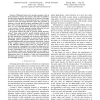Free Online Productivity Tools
i2Speak
i2Symbol
i2OCR
iTex2Img
iWeb2Print
iWeb2Shot
i2Type
iPdf2Split
iPdf2Merge
i2Bopomofo
i2Arabic
i2Style
i2Image
i2PDF
iLatex2Rtf
Sci2ools
153
click to vote
ICDE
2012
IEEE
2012
IEEE
Differentially Private Spatial Decompositions
— Differential privacy has recently emerged as the de facto standard for private data release. This makes it possible to provide strong theoretical guarantees on the privacy and utility of released data. While it is well-understood how to release data based on counts and simple functions under this guarantee, it remains to provide general purpose techniques that are useful for a wider variety of queries. In this paper, we focus on spatial data, i.e., any multi-dimensional data that can be indexed by a tree structure. Directly applying existing differential privacy methods to this type of data simply generates noise. We propose instead the class of “private spatial decompositions”: these adapt standard spatial indexing methods such as quadtrees and kd-trees to provide a private description of the data distribution. Equipping such structures with differential privacy requires several steps to ensure that they provide meaningful privacy guarantees. Various basic steps, such as choos...
Database | Decompositions | Dimensional Data | ICDE 2012 | Kd Trees |
| Added | 28 Sep 2012 |
| Updated | 28 Sep 2012 |
| Type | Journal |
| Year | 2012 |
| Where | ICDE |
| Authors | Graham Cormode, Cecilia M. Procopiuc, Divesh Srivastava, Entong Shen, Ting Yu |
Comments (0)

